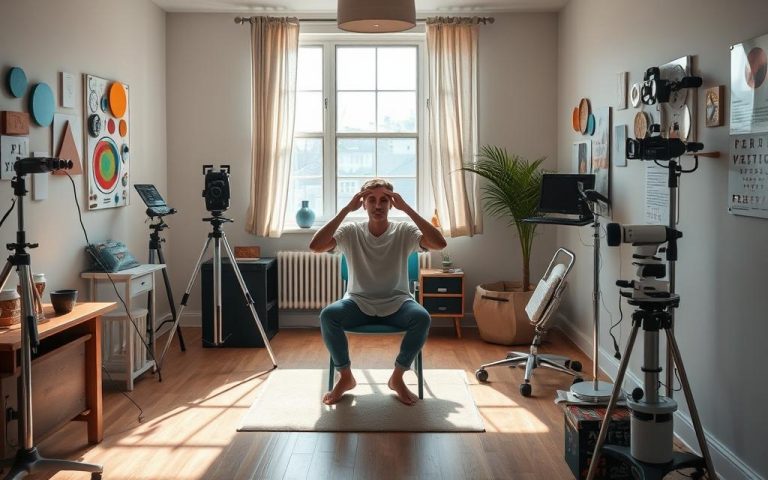Unlock the Power of CBT for Mental Wellness
Imagine having an incredibly strong tool to change how you think. Seeing challenges as chances to grow and be happy. That’s what Cognitive Behavioral Therapy (CBT) does. It helps you handle anxiety, depression, and other mental health problems. This leads you on a path to better mental health, using well-tested psychological methods.
CBT is more than just a type of therapy. It’s a way to really understand and deal with your thoughts and feelings. It shows you how to be strong and heal emotionally. By learning its special techniques, you can live a more satisfying life.
Key Takeaways
- CBT gives you the power to change harmful thoughts, which is key to mental health.
- The skills you learn in CBT can help with anxiety and depression every day.
- Using CBT can help you grow a lot as a person and be emotionally healthy.
- Cognitive Behavioral Therapy is based on a lot of scientific study.
- Working with CBT can help lead you to recovery and be a better you.
Introduction to Cognitive Behavioral Therapy
If you want to improve your mental health, learning about CBT can be really helpful. What is CBT? Cognitive Behavioral Therapy or CBT is a type of counseling. It helps people see and change negative thought patterns that affect their feelings and actions.
CBT is based on the idea that our thoughts and emotions impact how we behave. For example, someone who worries a lot about flying might avoid it. CBT teaches people they can’t control everything, but they can control how they react.
CBT overview shows it’s useful for many conditions like stress and OCD. It’s a therapy that focuses on changing how we think. It aims to:
- Eliminate biased thinking
- Boost problem-solving skills
- Build more belief in yourself
| Focus Area | Techniques Used | Expected Outcomes |
|---|---|---|
| Automatic Thoughts | Cognitive Restructuring | Less negative thoughts |
| Behavioral Patterns | Behavioral Experiments | Better ways to cope |
| Cognitive Distortions | Mindfulness | More awareness and focus |
Learning about CBT can change your view on mental health issues. It provides a path to improve mental health and enjoy life more. CBT helps with negative behaviors and thoughts.
Understanding the Basics of CBT
To really get Cognitive Behavioral Therapy (CBT), start with its basics. CBT is about making your thoughts better to handle your feelings and actions. It helps you change your negative thoughts. Then, you can improve how you process emotions. You also learn ways to deal with tough situations.
What Is CBT?
CBT is a kind of therapy that teaches people how to spot and change bad thought habits. These thoughts can make us feel and act in ways that hurt us. Basically, CBT says our problems come from faulty thinking and unhelpful behaviors. But, through CBT, we can learn to think and act in healthier ways.
Core Principles of CBT
CBT believes our thoughts, feelings, and actions are all related. So, fixing one might help with the others. This therapy breaks down big problems into smaller, easier parts to handle.
The cognitive model explains that how we think about things affects us. The ABC model (Antecedent, Belief, Consequence) is key. It shows us that issues come from how we see and respond to situations, not the situations themselves.
- Identification and challenging of negative beliefs
- Learning and practicing new, beneficial behaviors
- Developing practical strategies to manage emotional stress
CBT uses these three strategies to help lessen mental distress and boost life quality. By focusing on the basics and principles, you learn skills for handling present and future issues alike.
CBT Techniques for Anxiety
Discovering CBT techniques designed for anxiety control can greatly improve how you react to tough situations. Cognitive Behavioral Therapy (CBT) offers tools to change negative thoughts and get a grip on your emotions. This is how you can use them to feel better.
Cognitive restructuring is a big part of CBT for anxiety. It’s about spotting and fixing thoughts that might not be true. By swapping bad thoughts for realistic ones, you can lower your anxiety. This method helps you think in a more open and positive way.
Exposure therapy, a key CBT method, is also useful. It slowly makes you face your fears in a safe way. This can weaken your fears’ control, as you learn you can handle them. It helps you feel more in control and stop avoiding what makes you anxious.
Learning to relax is important in CBT for anxiety too. Skills like deep breathing and mindfulness can make you feel calmer. Practicing these often can help you keep your cool in stressful times.
- Cognitive Restructuring: Challenge and replace negative thoughts.
- Exposure Therapy: Gradually and repeatedly expose yourself to the source of your fear.
- Relaxation Techniques: Employ deep breathing, progressive muscle relaxation, or mindfulness to ease anxiety.
Using these CBT methods helps you deal with anxiety deeply, not just on the surface. As you get the hang of these, dealing with what makes you anxious will get better. You’ll see improvements in facing your fears and handling stress everyday.
CBT for Depression: A Path to Recovery
CBT for depression shows a way forward for those battling deep sorrow. It merges CBT techniques for depression to reshape your thinking and boost your inner strength.
Managing depression with CBT is all about spotting and changing those harmful thoughts. It’s finding small ways to stop the sadness cycle and feel a bit better.
- Identifying underlying cognitive distortions
- Practicing mindfulness to stay present and active
- Setting achievable goals to keep hope alive
These steps make progress possible, even when times are tough. Now, let’s dive into using CBT to treat depression practically:
Cognitive Behavioral Therapy helps you do more than cope with depression. It helps you take back your life and find a better path to mental health.
| Technique | Description | Expected Benefit |
|---|---|---|
| Cognitive Restructuring | Swap out bad thoughts with realistic, positive ones. | Lessens negative thinking |
| Behavioral Activation | Slowly join in fun things to feel better and more energetic. | Boosts mood by doing things |
| Problem-solving therapy | Learn to handle issues in a sensible way. | Teaches coping and cuts down on feeling stuck |
While CBT techniques for depression are powerful, making them part of your daily life is key. This ensures a lasting shift toward a more positive mindset as you fight off depression.
Start your life-changing journey with CBT for depression. Begin to unlock your power for a rich, rewarding life by using these CBT methods every day.
Self-Help: CBT Worksheets and Exercises
Empowering yourself through Cognitive Behavioral Therapy (CBT) is smart for better mental health. Working with CBT self-help methods adds to ongoing treatments. It helps you build your own ways to manage hard times. CBT worksheets and CBT exercises let you play an active role in your mental health progress.
Printable CBT Worksheets
Printable CBT worksheets are key for spotting triggers, tracking thoughts, and changing unhelpful habits. They start with easy steps to notice these patterns. Then, they move on to deeper ways to reshape how you think. You can use them alone or as an extra bit for therapy. They’re great to see how you’re doing and find where you need to work more.
Guided CBT Exercises for Daily Practice
Guided CBT exercises are daily activities to help you learn about thinking and acting. They include things like paying better attention and solving problems well. These exercises help you get better at managing your feelings and thoughts. They’re made to grow your skills and make you feel more sure about dealing with life challenges.

Using both CBT worksheets and guided CBT exercises is great for looking inside and making progress. They’re not just for dealing with tough times now. They also help you get stronger and feel more able to handle stress in the future. This can really change your life for the better.
The Science Behind CBT and Its Effectiveness
The science behind CBT is based on years of rigorous research. This research shows that CBT works well in treating different mental health issues. We will look at how Cognitive Behavioral Therapy affects the brain. We’ll also talk about the studies that have proven its success.
Evidence-Based Research on CBT
Studies on CBT always find positive results for many mental health problems. By doing many strict tests and clinical trials, we know CBT works best under certain conditions. This gives solid proof for doctors and patients.
| Study | Year | Outcome |
|---|---|---|
| Impact of CBT on Depression | 2019 | Significant reduction in depressive symptoms |
| CBT for Anxiety Disorders | 2020 | Reduction in anxiety levels and improved coping strategies |
| Cognitive Behavioral Techniques in PTSD | 2018 | Improved PTSD symptoms and increased resilience |
| CBT in Addiction Recovery | 2021 | Better management of addictive behaviors and relapse prevention |
How CBT Impacts the Brain
CBT brings about important neurobiological changes. These changes improve our mental health. Brain imaging studies have shown changes in how our brain works and connects. Key areas of the brain linked to controlling emotions and making decisions become more active. This leads to better mental health outcomes.
Learning about the scientific side of CBT helps us see its value in mental health care. This understanding leads to smarter therapy choices. It makes CBT more effective.
Advantages of CBT Online Therapy
CBT online therapy has many benefits for those looking for mental health support. These include easier access and great flexibility. Let’s look at how these can help you on your mental wellness journey.
One huge benefit of online therapy is how easy it is to join from anywhere. This means you can have your sessions at home, while traveling, or even in a new city. Such flexibility helps you keep up with your therapy, which is key for good outcomes. It also means more scheduling options, fitting therapy easily into your life without a commute.
CBT online therapy allows you to work through cognitive behavioral practices in the privacy and comfort of your own surroundings, which can significantly ease the stress of opening up about personal issues.
Other key online therapy benefits are staying anonymous and breaking the stigma around mental health help. Many avoid getting help because of this. Being able to start therapy online can make it much simpler to begin.
| Advantage | Details | Impact on Therapy |
|---|---|---|
| Accessibility | Sessions from any location | Ensures consistent access to therapy, crucial for success |
| Flexibility | 24/7 availability and easy rescheduling | Adapts to your lifestyle, enhancing therapy adherence |
| Anonymity | Less fear of judgment due to remote interaction | Reduces barriers to starting therapy, boosting early engagement |
In the end, CBT online therapy doesn’t just keep up with in-person therapy. It also brings unique advantages that fit our lifestyles today. By using these virtual therapy advantages, you can find your way to better mental health with more comfort and confidence.
Real-Life Success Stories: CBT Benefits
See how Cognitive Behavioral Therapy (CBT) has helped many people. Real stories show how CBT makes a real difference. These success stories illustrate the lasting impact of this therapy.
Overcoming Anxiety with CBT
CBT has changed the lives of people dealing with anxiety. They’ve seen big drops in their daily worries. Also, they’re better at handling stress now. Through CBT, they’ve learned how to take apart their big worries. Then, they replace them with more logical thoughts.
Transforming Lives Through CBT for Depression
Many find CBT effective against depression. It helps change negative emotions and actions. This way, people gain the power to defeat their depression. They start feeling hopeful and enjoying life again.
CBT success stories show how it’s not just for symptoms. It’s about making everyday life better. It helps break free from depression or find peace with anxiety. CBT offers a steady, thought-out way to maintain mental health and happiness.
Choosing the Right Therapist for CBT
Finding the right CBT therapist is key when starting cognitive behavioral therapy. It’s not just about their qualifications. You need someone you trust and feel a connection with. Here’s what to consider when looking for a CBT therapist.
It’s important that the therapist is skilled in CBT. They should have a lot of training in this area, so they can help you effectively. It’s best to choose a therapist certified by a known CBT organization.
Look for someone with a lot of experience. A seasoned CBT therapist might have helped people with issues like yours in the past. This means they can adjust their methods to best suit your needs.
| Qualification | Experience | Specialization |
|---|---|---|
| Licensed Psychologist | 5+ years in CBT | Anxiety Disorders |
| Licensed Clinical Social Worker | 3+ years in CBT | Depressive Disorders |
| Licensed Professional Counselor | 7+ years in CBT | Obsessive-Compulsive Disorders |
Talk to the therapist about their methods and what they expect from therapy. A good CBT therapist should clearly explain the strategies they use and how long it might take to see results. Knowing what to expect helps you set real and achievable goals for your well-being.
- Therapist selection for CBT involves evaluating credentials.
- Ensure they have a motivational interviewing skill set.
- It’s beneficial if the therapist integrates complementary approaches where necessary.
Choose a therapist who understands your needs and matches your personal style. A good match can significantly improve the outcome of your therapy. It’s about feeling comfortable and understood to ensure your therapy is successful.
Conclusion
As we wrap up our look at CBT, it’s good to remember how powerful and flexible this therapy is. It’s great not just for tackling anxiety and depression, but also in improving our overall mental health. Over this journey, we’ve learned about many tools, like changing how we think and brave facing our fears. These tools help us manage our emotions and thoughts better, leading to a healthier mind.
CBT’s impact goes beyond just helping us feel better now. It actually gives us skills for life. These skills are to face and handle problems in our minds. We hope you now see how CBT, with its specific strategies, can make a big difference. It can really help in getting better and staying strong. Both science and experiences show that CBT is a powerful mental health support tool.
Finally, we encourage you to think about fitting CBT in your own mental health plan. You can start with learning on your own, doing exercises, or getting expert help. CBT offers a way to live more thoughtfully, evenly, and fully. By using its methods, you can begin a journey towards recovering and finding new things about yourself.
FAQ
What is Cognitive Behavioral Therapy (CBT)?
Cognitive Behavioral Therapy (CBT) helps us understand the link between our thoughts, feelings, and actions. It looks at how changing the way we think can make us feel and act better. This approach supports people to spot and change negative thought patterns. It helps to develop healthier ways of thinking and behaviors to boost our mental health.
What is the goal of CBT?
CBT aims to make us aware of our negative thoughts, teaching us to think in a healthier way. By changing our thinking, it helps improve how we feel and how we react. The ultimate goal is to manage our emotions better, cope with challenges effectively, and engage in positive actions.
What are the core principles of CBT?
CBT has two key models, the cognitive and the ABC model, which show how thoughts, events, beliefs, and actions are linked. It’s important for the therapist and client to work together. They use proven techniques to challenge negative thoughts and to achieve positive changes.
Can CBT help with anxiety?
CBT is great at tackling anxiety. It teaches skills like changing your thoughts or gradually facing your fears. These help people manage their anxiety better. CBT provides the means to lower anxiety and take back control of your life.
Is CBT effective for treating depression?
Yes, CBT is a top choice for battling depression. It focuses on changing negative thoughts, solving problems, and enjoying life. By working on these aspects, CBT can reduce depression symptoms and support recovery.
Are there self-help resources available for CBT?
Indeed, there are worksheets and exercises you can use on your own with CBT. These support the work done in therapy. They help you practice CBT techniques in your daily life. By using these resources, you become more proactive in managing your mental health.
Is there scientific evidence supporting CBT?
There’s strong scientific proof that CBT works for many mental health issues. Studies consistently show its effectiveness against anxiety, depression, and more. Research also suggests that doing CBT can physically change our brain for the better.
What are the advantages of CBT online therapy?
CBT online therapy is convenient and offers more flexibility. It lets you join sessions from anywhere, making it easier to get help. It fits your schedule better, especially if you’re busy. Online therapy also ensures your privacy while providing effective support.
Can you share any real-life success stories of CBT?
Certainly! Many people have improved their mental health with CBT. It has helped them fight anxiety and beat back depression. These success stories show the power of CBT in bringing positive change to people’s lives.
How do I choose the right therapist for CBT?
To find the right CBT therapist, look into their education and CBT experience. A therapist who’s licensed and well-trained in CBT can greatly help. But, it’s also very important that you feel at ease with them and see them as a trusted partner in your wellbeing.






